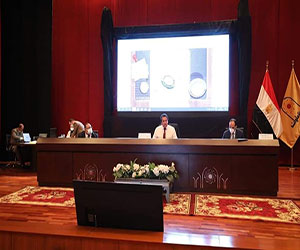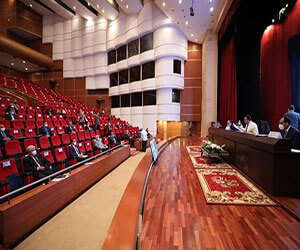The Supreme Council of Universities: Coordination for the next academic year with the same coordination rules in force
The Supreme Council of Universities held its periodic meeting, today, Saturday, under the chairmanship of Dr. Khaled Abdel Ghaffar, Minister of Higher Education and Scientific Research, in the presence of Dr. Mohamed Latif, Secretary of the Supreme Council of Universities, and members of the Council, at the headquarters of Helwan University.
The Council thanked Helwan University, headed by Prof. Dr. Maged Negm, President of the University; for hosting the meeting of the Supreme Council of Universities.
The Council reviewed the reports of the presidents of universities about the exams at the end of the second semester of the current academic year. All reports indicated the regularity of the conduct of exams in all universities and institutes, with full commitment to applying all necessary preventive measures; And ensuring the safety of all elements of the education system in universities, as these reports indicated that students attended almost the same usual attendance rates in the years prior to the Corona pandemic. The Minister of Higher Education directed that universities and institutes continue to adhere fully to all precautionary measures until the end of the exams, and the need for all universities and institutes to commit to announcing the results to students during July. The Minister also thanked the faculty staff, administrators, and all university and institute employees for their discipline and commitment in completing the end-of-school year exams, and their willingness to vaccinate against the new Corona virus in the centers designated by universities for this purpose, and the Minister also directed the continuation of vaccination in universities so that faculty members, administrators and all workers can from getting vaccinated for their own safety. The Minister also thanked the Ministry of Health and Population for the speedy provision of the vaccine against the emerging corona virus for university and institute employees.
The Minister thanked the Supreme Council of University Hospitals headed by Dr. Hossam Abdel Ghaffar, and all workers in the university hospital sector for the distinguished role in dealing with the Corona pandemic during the first, second and third waves, with an emphasis on the continuation of university hospitals in a state of permanent readiness and anticipation in accordance with the plans approved by the Supreme Council of University Hospitals.
In its meeting, the Supreme Council also thanked the committee formed to nominate university presidents for its great efforts during the past period, as the committee practiced its work legally according to the criteria for differentiation set by the legislator in this regard, without considering any other considerations, and the Council also affirmed its full support for the continuation of the independence of the committee’s work against Any attempts to interfere with its work by publishing any false news affecting its work,
 |
 |
|
The Council stressed the need to use legitimate channels to communicate with the concerned authorities in the Ministry to clarify the facts of matters before promoting misleading news that negatively affect the image of state institutions. The Council stressed the need for universities to commit to implementing the decisions of the Supreme Council and the ministerial decisions regulating them, and to take the necessary legal measures in the event of non-compliance. implementation of these decisions.
During the meeting, the Minister presented a summary of the results of his recent visit to Portugal during the period from 10 to 12 June, which included participation in the activities of the High-level European-African Space Forum for Earth Observation, a visit to the University of Nova and Universidad Católica, Portugal, in addition to holding a meeting with the Portuguese Minister of Science, Technology and Higher Education. ; where they discussed mechanisms for enhancing scientific cooperation between the two countries and signing a memorandum of understanding for joint cooperation.
In implementation of the directives of the President of the Republic regarding the contribution of universities to meeting the needs of society, the Council agreed to implement a comprehensive plan that includes activating the role of universities in solving environmental and societal problems, spreading contemporary educational thought, and motivating faculty members, their assistants and students to participate in the community in protecting the environment, and preserving the integrity of the environment. The university’s internal affairs, marketing the services provided by colleges and activating their role in community service, qualifying graduates for the labor market, organizing competitions for individual and group research for university and institute students, organizing scientific and cultural seminars for students, providing opportunities for student exchange between educational institutions, and implementing visits and trips to a number of Egyptian cities and foreign countries.
The Council was informed of the Cabinet’s approval of the Prime Minister’s draft decision to amend the second paragraph of Article No. (79) of the Executive Regulations of the Universities Organizing Law promulgated by Law No. 49 of 1972, and the amendment states “that for studying with the credit hours or points system, the degree is granted when The student has fulfilled the requirements for obtaining it, including the minimum number of years of study, all in accordance with what is determined by the internal regulations of the faculties.” This important historical amendment gives the opportunity for university and institute students to graduate immediately after they fulfill the number of credit hours required by their scientific majors and after fulfilling the requirements specified by the internal regulations For colleges that adopt the credit hour system, without being restricted to the number of years required for study indicated in Chapter Four of the Executive Regulations of the Universities Organizing Law for each college separately.
The Council directed the universities and the concerned sector committees to start taking the necessary measures towards switching to the credit hour systems and amending the internal regulations of the colleges to allow the application of this amendment that was approved by the Council of Ministers.
The Council approved the cooperation of Egyptian universities with the Transparency and Community Participation Unit at the Ministry of Finance, to enhance the principles of transparency and financial disclosure, and to engage citizens to cooperate with government agencies, and to train young people and girls to improve the level of government services provided to citizens, by organizing several introductory and educational seminars for students, and organizing simulation programs for the Ministry of Finance. .
The council agreed to activate the partnership between the faculties of education in Egyptian universities and some schools in the Ministry of Education, to link between theoretical and practical content, develop the educational process, improve educational practices, build the capacities of training units, enhance teachers’ capabilities, and support teaching and learning practices in faculties of education.
The Council reviewed a report on the development of the international student system, within the framework of the “Study in Egypt” initiative, to attract more students to study in all Egyptian universities. The Council affirmed the commitment of all universities and institutes to facilitate the procedures for joining international students to universities and institutes in line with the new digital system of the central administration for international students at the Ministry of Higher Education.
The Council agreed to take the necessary measures to amend some provisions of the executive regulations of the Universities Organizing Law regarding the unification of the name of the faculties of fisheries with a number of Egyptian universities, and to postpone the establishment of new faculties in the field of fisheries during the current period.
The Council approved the proposal submitted by Helwan University regarding adding the topic of "Digital Media Education" as a chapter within the contents of the "Social Issues" course for college students in universities, which was previously approved as a university graduation requirement.
The Council discussed the rules for accepting students who obtained the Egyptian General Secondary Certificate and its equivalent Arab and foreign certificates and technical certificates to join public universities in the academic year 2021-2022.
The Council agreed to coordinate admission to universities and institutes for the 2021-2022 academic year with the same coordination rules in force without change.
The Council agreed to conduct aptitude tests for students wishing to enroll in faculties of tourism, hotels and nursing, provided that aptitude tests are conducted for all faculties whose admission requires passing aptitude tests immediately after the end of the high school exams.
The Council approved the general rules for accepting students with equivalent secondary certificates (Arab and foreign), and applicants to the Coordination Office, to join some faculties of public universities in the academic year 2021-2022, where a minimum percentage of a certain percentage of the total maximum of the legal total for each certificate, which came as follows:
To have a minimum of at least 95% to enroll in medical faculties.
The minimum percentage of at least 90% to express a desire to join the faculties of dentistry, pharmacy, physical therapy, economics, political science and media.
To have a minimum score of at least 85% to express a desire to join the faculties of engineering, computers and information.
Acceptance should take precedence over the total or legal total of the student’s grades, within the limits of the numbers prescribed for each certificate, given that these colleges require a distinguished academic level.
Submission of the document stating the actual legal residence of the student and his guardian in the country from which the student obtained the equivalent secondary certificate for the duration of the study on which the equivalent secondary certificate is granted (and the date of the start and end of the study and the end of the exams are determined by a letter authenticated by the Egyptian cultural advisor from the state The certificate’s donor or the cultural advisor of the state granting the certificate in the Arab Republic of Egypt), by presenting an actual residence documented by the Egyptian cultural advisor or the Egyptian embassy in the granting country, a passport showing the dates of entry and exit and a movement certificate indicating the dates of entry and exit, in implementation of the judicial ruling issued from the State Council on this matter.


.svg)




